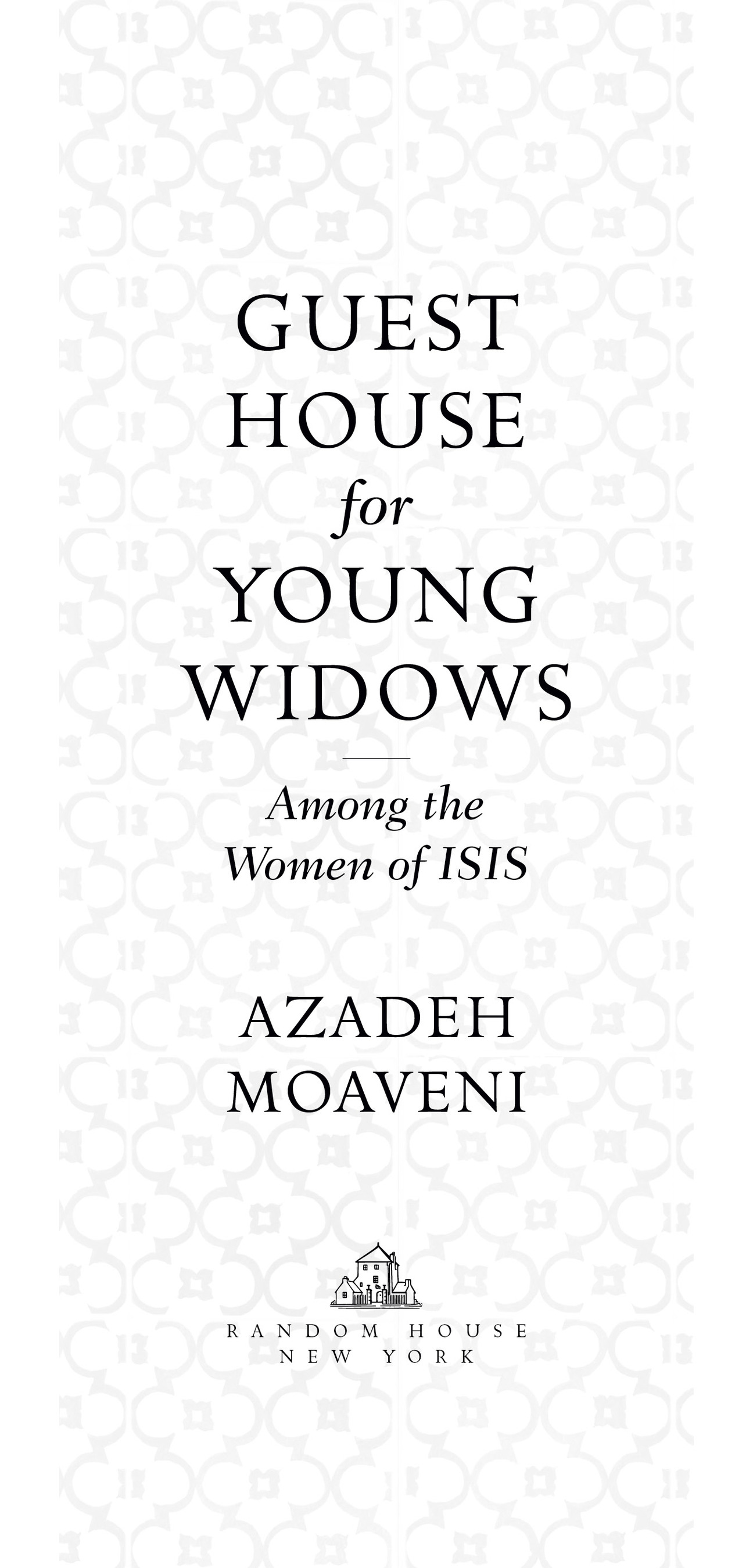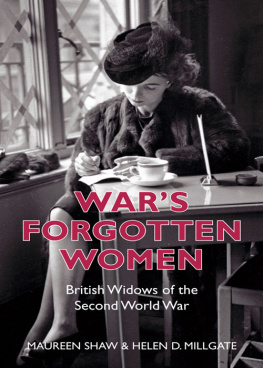Azadeh Moaveni - Guest House for Young Widows: Among the Women of ISIS
Here you can read online Azadeh Moaveni - Guest House for Young Widows: Among the Women of ISIS full text of the book (entire story) in english for free. Download pdf and epub, get meaning, cover and reviews about this ebook. year: 2019, publisher: Random House, genre: Non-fiction. Description of the work, (preface) as well as reviews are available. Best literature library LitArk.com created for fans of good reading and offers a wide selection of genres:
Romance novel
Science fiction
Adventure
Detective
Science
History
Home and family
Prose
Art
Politics
Computer
Non-fiction
Religion
Business
Children
Humor
Choose a favorite category and find really read worthwhile books. Enjoy immersion in the world of imagination, feel the emotions of the characters or learn something new for yourself, make an fascinating discovery.
- Book:Guest House for Young Widows: Among the Women of ISIS
- Author:
- Publisher:Random House
- Genre:
- Year:2019
- Rating:5 / 5
- Favourites:Add to favourites
- Your mark:
- 100
- 1
- 2
- 3
- 4
- 5
Guest House for Young Widows: Among the Women of ISIS: summary, description and annotation
We offer to read an annotation, description, summary or preface (depends on what the author of the book "Guest House for Young Widows: Among the Women of ISIS" wrote himself). If you haven't found the necessary information about the book — write in the comments, we will try to find it.
Guest House for Young Widows: Among the Women of ISIS — read online for free the complete book (whole text) full work
Below is the text of the book, divided by pages. System saving the place of the last page read, allows you to conveniently read the book "Guest House for Young Widows: Among the Women of ISIS" online for free, without having to search again every time where you left off. Put a bookmark, and you can go to the page where you finished reading at any time.
Font size:
Interval:
Bookmark:


Copyright 2019 by Azadeh Moaveni
All rights reserved.
Published in the United States by Random House, an imprint and division of Penguin Random House LLC, New York.
R ANDOM H OUSE and the H OUSE colophon are registered trademarks of Penguin Random House LLC.
Hardback ISBN9780399179754
Ebook ISBN9780399179761
randomhousebooks.com
Book design by Susan Turner, adapted for ebook
Cover design: Greg Mollica
Cover photographs: Hiroshi Watanabe/Gallery Stock (woman), Lorenzo Meloni/Magnum Photos (city)
v5.4_r2
ep
Spring 2007, Le Kram, Tunis
Nour didnt consider herself a pearl without a shell, or a lollipop without a wrapper, or anything other than her thirteen-year-old self, wanting to practice her religion as best she could. She had listened to a sheikh on YouTube argue why the face veil was obligatory for Muslim women, and after listening a further four times, his words played like a ticker tape through her mind. The Quran commanded, in the verse called Surah al-Noor, The Light, that women not display their beauty and ornaments, except for that which is apparent. And is the face apparent? the sheikh argued. Is there anything less apparent than a face? It seemed to inexorably follow, then, that women wishing to submit to the divine will of God, to be eligible for His blessings and judged by Him approvingly, should cover their faces. The sheikhs words made intuitive sense to Nour: modest covering enrobed women in the core values of Islam itself, in peace, calm, and equality. It dimmed the visible differences between rich women and poor women, dark and fair, beautiful and plain; it was a reminder that God loved all His creations equally.
Nour shared this new belief with her girlfriends one afternoon in the spring of 2007 as they were sitting in the park, Le Krams nominal neighborhood green space, amid parched palm trees, heaps of garbage, and a decaying swing set covered in rust. The girls agreed it sounded persuasive, and one of them asked, So whos going first? Most of them had started covering their hair when their bodies began filling out in the last few years, just a light scarf, and they also had begun praying, as many did in their families and in the neighborhood. Wearing a hijab was ordinary; even though Tunisias laws banned the headscarf in schools and you could get sent home for wearing one, it was still a commonplace enough infraction. The face veil, the niqab, was punchier, more assertive. But the sheikh on YouTube had said one shouldnt be timid about ones Islam, that even though wearing hijab was tough in so many places, the more we are in number, the stronger our message.
Had Nour been born to an upper-middle-class family in La Marsa, a suburb of the city where liberal Tunisians lived amid Western expatriates and restaurants that served prosciutto and gin, she might have rebelled by piercing her tongue. But she was a daughter of Le Kram, a working-class neighborhood in a country where the state micro-policed peoples piety, and putting on the niqab was a natural act of defiance for a teenage girl. That day in the park, as the sunlight caught the glinting sides of the juice packs in the trash heap, she felt a knot of purpose in her stomach. Ill do it first, she said to her friends. Ill do it tomorrow.
She already had a niqab from the hijab shop near the pizzeria; she had bought it the previous week after watching videos of the sheikh. She had tried it on in the bathroom at home with the door locked, angling her body in different directions to see what it did to her eyes.
The next morning, she stuffed it into her schoolbag, and said goodbye to her mother as usual. As she neared the school she slipped into a doorway and pinned the niqabby itself it was a small thing, just a little scrap of fabric that covered her nose and mouthto her headscarf. The fabric tickled her lips as she breathed against it.
The principal often stood outside the main doors of the school in the morning, greeting pupils as they hurried up the steps. Nour fell in behind some older girls, hoping to pass by without notice, but the principal stopped her.
Who are you? she asked, peering at the slim frame obscured by the folds of black. Nour heard, if it wasnt her imagination, a flicker of appreciation in the womans voice. Im going to let you in, the principal said. But youre going to have to deal with the teachers yourself.
Nours first class of the day was French, and she took her usual seat in the classroom, assembling her notebook and pens on the wooden desk. The teacher looked at her from across the classroom. She didnt say anything at first, just narrowed her eyes, then approached Nour, stopping to lean on an empty desk a couple of meters away.
What is this ridiculous thing youre wearing? Do you think God wants you to hang a curtain across your face? I hate God. God isnt some kind, benevolent power, hes cruel. The teacher crossed her arms over her chest, nostrils twitching. To Nour, the things the French teacher was saying were blasphemy. Nour stared ahead at the blackboard, focusing on the strange curve of the teachers handwriting. God killed my parents, the French teacher continued. If I could take revenge against God, I would. The class watched the berating in unprecedented silence. The French teacher finally rose and started the lesson.
Nours next class was Arabic literature. In Tunisia, teaching of the humanities, especially literature, tended to draw Francophone secularists with a deep antipathy to the religious, whom they viewed as backward and uncultured. When the literature teacher saw Nour, she rose from her seat in surprise and walked over, blocking Nour from reaching her desk.
Youre not sitting in my class with that thing on. Take it off immediately! she said.
Nours face went hot, and she refused.
I said, take it off, the teacher repeated, punctuating each syllable.
Nour wondered if the teacher knew it was her. The literature teacher liked her. Would it matter? No, I cant, please. Its me, its Nour. Her voice trembled.
The teacher moved forward and placed a hand on Nours chest. Didnt you hear me? I told you to take it off. She was shouting now, her face distorted and ugly with anger.
Nours heart roared in her ears. She stepped backward, away from the weight of the hand. Students gathered around them, trying to calm the teacher. She pushed them away and planted both of her hands on Nours chest, shoving hard, as if to topple her.
Nour gasped and stumbled backward. The teachers arm rose again, as if to strike her, as if to pull the niqab off. One of Nours friends in the class, a tall girl who sometimes got called the Giraffe, grabbed the teachers hand. Please, ustadha, please, calm down.
Nour was crying, glad only that no one could see the tears of humiliation under her niqab. By now, the class was openly rioting. Someone had fetched the principal, who came running into the room and ordered the students into the schoolyard. Classes were canceled for the rest of the day.
IN THE MID-TWENTIETH CENTURY AND the decades that followed, men and women led the Middle Easts armed opposition groups and insurgencies together. The women who took part often became international celebrities. The Algerian resistance fighter Djamila Bouhired, who opposed French rule of her country in the 1950s, planted a bomb in an Algiers caf that killed three people. A French colonial court sentenced her to death and she was tortured in prison. Her trial became an international cause clbre, prompting a Moroccan princess, tens of British parliamentarians, and Bertrand Russell to plead her case to the president of France, who eventually stayed her execution. Bouhired later married her French defense attorney, who had fallen in love with her during her trial, and became known as the Arab Joan of Arc. She was featured in
Font size:
Interval:
Bookmark:
Similar books «Guest House for Young Widows: Among the Women of ISIS»
Look at similar books to Guest House for Young Widows: Among the Women of ISIS. We have selected literature similar in name and meaning in the hope of providing readers with more options to find new, interesting, not yet read works.
Discussion, reviews of the book Guest House for Young Widows: Among the Women of ISIS and just readers' own opinions. Leave your comments, write what you think about the work, its meaning or the main characters. Specify what exactly you liked and what you didn't like, and why you think so.










